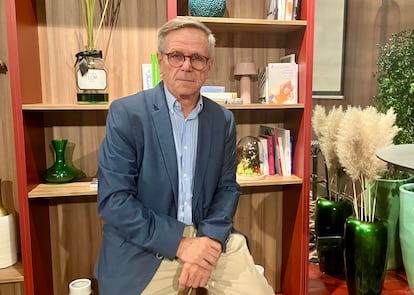Gonzalo Pin, expert in pediatric sleep medicine: ‘False expectations regarding children’s sleep are the most difficult thing to fight’
The pediatrician explains that rest is essential for the physical and mental health and the proper development of minors


“We are not aware of the importance of sleep throughout life, but especially in early childhood and adolescence,” says pediatrician Gonzalo Pin, who specializes in sleep medicine.
False expectations and myths surrounding sleep are, according to the team leader of the Sleep Unit of the Pediatric Service of the Quirón Hospital in Valencia, Spain, two direct consequences of the lack of training and information on this topic, both among the population and many health professionals. A deficit that Pin, one of the leading Spanish experts in pediatric sleep medicine, wants to help fix with his first book, El sueño es vida: el sueño infantil como nunca te lo han explicado (Sleep is life: Children’s sleep as they have never explained it to you). This work provides mothers and fathers with an entertaining and informative way to access all the scientific evidence obtained in the last three decades on the sleep of children and adolescents.
The pediatrician acknowledges that we only know “the tip of the iceberg” regarding sleep. Still, it is enough to be clear about one thing: that it is essential for the physical and mental health and the proper development of the pediatric population.
Question. Based on your experience, is sleep one of the main concerns of parents during the first years of their children’s lives?
Answer. Yes, yes, and increasingly more. At the end of the day, it is an information problem. If you are told beforehand that during the first year of your healthy child’s life you are going to sleep an hour and a half less than before each night, and that a child wakes up on average three or four times a night, your level of expectations and anxiety will automatically decrease. If they also tell you from the beginning, for example, that affectivity, contact with the environment, the contrast between day and night and having support to take care of the baby are all very important for your child to sleep better, then you already know what to do to improve your child’s rest. But the thing is that we need better information from the point of view of health educators.
Q. You’re kind of shooting yourself in the foot there.
A. [Laughs] Yes. But it’s true: we should give much more information based on scientific evidence, because we already have that evidence about how sleep evolves from pregnancy to adolescence. However, in many cases we are still giving advice based on beliefs from 40 years ago.
Q. Has this lack of knowledge fueled certain myths?
A. Ignorance is very bold, we know that. Until relatively recently sleep was not perceived as something based on scientific evidence, so people gave their opinions based on their own experience. Now we know, for example, that breastfeeding favors the child’s acquisition of biological rhythms, that breast milk, having more melatonin at night, favors children’s sleep, and that, contrary to popular belief, children who drink breast milk sleep more, and their mothers too. In the past, people used to believe that giving them the bottle would make them sleep the entire night, and many grandmothers still teach this idea.
Q. What would you say is the most common myth that you see in consultation?
A. There are two or three, but the one that gets to me the most is that damn phrase “my son doesn’t sleep as much as he should.” There is no “should” with sleep. Each child has their own needs and we have to respect them. False expectations of mothers and fathers regarding their children’s sleep is the most difficult thing to fight. People understand very well, for example, that one kid can eat 22 tablespoons of rice and another five, and that, if the latter is alright, then it’s okay. But we have not yet understood that our eldest son’s sleep is not going to be the same as that of our youngest son, or that of the neighbor’s son. This is one of the things I try to explain in the book, that sleep is a maturational process and, as such, it has its individual variations.
Q. We are very concerned about sleep in early childhood — because it interferes with ours, that of adults — but then we kind of let our guard down.
A. Yes, and that is a mistake. In adolescence, for instance, sleep is even more important. Adolescents have slightly greater sleep needs than preadolescents, but they have some differential characteristics: they have a delayed onset of melatonin secretion, which means that they tend to go to sleep later; they have a greater sensitivity to light late in the day, which further increases the delay in melatonin secretion; and, in addition, they are less sensitive to early morning light, which means that they take longer to wake up. As if all this were not enough, some very relevant changes occur in the brain at this stage, especially in the affective part, the amygdala, which cause, for example, social relationships to greatly influence sleep.
Q. You claim that we mistreat teenagers.
A. First of all, we give them unnatural school schedules. Based on what we mentioned earlier, they should start classes later, and yet, they start earlier. On the other hand, they should have soccer or basketball training earlier, but we put that at the end of the day, so that they come home even more excited. But, in addition, knowing that they are undergoing a very important process of development of the emotional part of the brain, we constantly give them exams, ask them to decide their future... in my opinion, the problem is a lack of knowledge and a low appreciation of the importance of sleep in the adolescent population by educational and health authorities.
Q. Between the dizzying pace of life and the proliferation of screens, do today’s children and teenagers sleep less than ever before?
A. We have no data to confirm this, but it certainly seems like it. And the problem is not that they are the ones who sleep the least in history, but the speed with which we are shortening the hours of sleep. In the end, the environmental ecosystem in which the child develops conditions sleep, so we can say that many sleep problems are determined by the society in which one lives. You just have to see how advanced Western societies have many more sleep problems than traditional Eastern societies, for example. Some tribes in central Africa don’t even have a word for insomnia in their language. Does that mean that we have to go back to the Paleolithic? No, but we do have to understand that the environmental ecosystem is a determining factor in the quality of sleep of children, adolescents and adults.
Q. What are the consequences of this chronic sleep deficit?
A. In the long term we don’t know, but in the short term, what a coincidence, for example, that most mental illnesses begin in adolescence, or that we have a high rate of teenagers who consume marijuana, or that we have high school failure and dropout rates. Sleep is a basic element that has transversal role throughout the body and a very important influence on our physical and mental health, so we should take care of it.
Sign up for our weekly newsletter to get more English-language news coverage from EL PAÍS USA Edition
Tu suscripción se está usando en otro dispositivo
¿Quieres añadir otro usuario a tu suscripción?
Si continúas leyendo en este dispositivo, no se podrá leer en el otro.
FlechaTu suscripción se está usando en otro dispositivo y solo puedes acceder a EL PAÍS desde un dispositivo a la vez.
Si quieres compartir tu cuenta, cambia tu suscripción a la modalidad Premium, así podrás añadir otro usuario. Cada uno accederá con su propia cuenta de email, lo que os permitirá personalizar vuestra experiencia en EL PAÍS.
¿Tienes una suscripción de empresa? Accede aquí para contratar más cuentas.
En el caso de no saber quién está usando tu cuenta, te recomendamos cambiar tu contraseña aquí.
Si decides continuar compartiendo tu cuenta, este mensaje se mostrará en tu dispositivo y en el de la otra persona que está usando tu cuenta de forma indefinida, afectando a tu experiencia de lectura. Puedes consultar aquí los términos y condiciones de la suscripción digital.








































